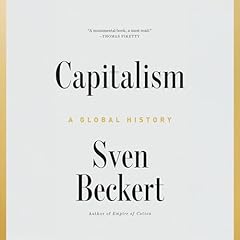
Capitalism, Alone
The Future of the System that Rules the World
No se pudo agregar al carrito
Add to Cart failed.
Error al Agregar a Lista de Deseos.
Error al eliminar de la lista de deseos.
Error al añadir a tu biblioteca
Error al seguir el podcast
Error al dejar de seguir el podcast
 Exclusivo para miembros Prime: ¿Nuevo en Audible? Obtén 2 audiolibros gratis con tu prueba.
Exclusivo para miembros Prime: ¿Nuevo en Audible? Obtén 2 audiolibros gratis con tu prueba.Compra ahora por $19.10
-
Narrado por:
-
Bob Souer
-
De:
-
Branko Milanovic
We are all capitalists now. For the first time in human history, the globe is dominated by one economic system. In Capitalism, Alone, leading economist Branko Milanovic explains the reasons for this decisive historical shift since the days of feudalism and, later, communism. Surveying the varieties of capitalism, he asks: What are the prospects for a fairer world now that capitalism is the only game in town? His conclusions are sobering, but not fatalistic. Capitalism gets much wrong, but also much right - and it is not going anywhere. Our task is to improve it.
Milanovic argues that capitalism has triumphed because it works. It delivers prosperity and gratifies human desires for autonomy. But it comes with a moral price, pushing us to treat material success as the ultimate goal. And it offers no guarantee of stability. In the West, liberal capitalism creaks under the strains of inequality and capitalist excess. That model now fights for hearts and minds with political capitalism, exemplified by China, which many claim is more efficient, but which is more vulnerable to corruption and, when growth is slow, social unrest. As for the economic problems of the Global South, Milanovic offers a creative, if controversial, plan for large-scale migration.
©2019 the President and Fellows of Harvard College (P)2019 TantorLos oyentes también disfrutaron:




















Las personas que vieron esto también vieron:


new perspective
Se ha producido un error. Vuelve a intentarlo dentro de unos minutos.
No pdf of figures
Se ha producido un error. Vuelve a intentarlo dentro de unos minutos.
Milanovic describes two major types of Capitalism in operation today: the liberal Capitalism practiced by the (nominally) democratic West, and authoritarian Capitalism such as that practiced in China. The author also speculates on the likelihood of other manifestations of Capitalism that may become more prominent in the future. One such possibility is where everyone is an individual Capitalist, in an atomized society where every worker is also an owner—the current gig economy is a step toward that (e.g. those providing their own cars for work with Uber or Lyft).
One theme throughout the book is that Capitalism is the only system left standing—without a competitor anywhere on the horizon. This may be reminiscent of "There is no alternative," but it seems different in character from the Thatcher expression TINA. Milanovic aptly observes that Communism in the pure Marxist sense has rarely been implemented—similarly the word "socialism" has not been widely used in its Marxist meaning. Milanovic further reasons that Marxist Communism cannot occur in the future, as it relies on the existence of manufacturing labor in conflict with pure Capitalist owners—and both are in decline today.
Milanovic does not come to a firm conclusion regarding whether Capitalism as it is evolving will be able to correct the extreme inequality that currently exists. But the author does leave room for hope that economic forces may force its hand to that effect—let's do all we can to make that a reality.
Comprehensive assessment of Capitalism
Se ha producido un error. Vuelve a intentarlo dentro de unos minutos.
The author has absolutely no concept of the full implications of his assertions. anyone hoping for a read based on objective factors is going to be utterly disappointed. aside from the fact the author simply asserts hypothetical situations as facts and then proceeds to elaborate based on those assertions, there is nothing factual in this material upon which the author bases his claims.
unfortunately, it's just another pile of dribble based on the assumption a distribution of wealth Will solve all of the socioeconomic woes of which he complains. at the very least, I might be able to save others from wasting their time, money and effort.
Don't waste your money or time on this dribble. Th
Se ha producido un error. Vuelve a intentarlo dentro de unos minutos.


